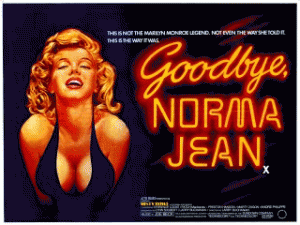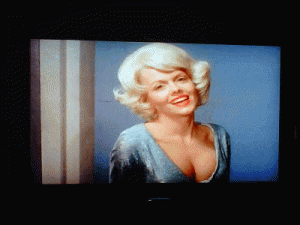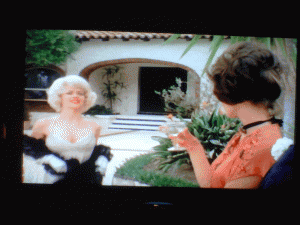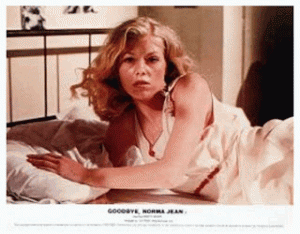From Monthly Film Bulletin , September 1976, vol. 43, no. 512. — J.R.
Goodbye, Norma Jean
U. S.A./Australia, 1975
Director: Larry Buchanan
Hollywood, 1941. Ogled by her foster father and despised by her foster mother, Norma Jean Baker is thrown out by the latter and takes work in a factory. Raped by a policeman whom she earlier persuaded not to give her a speeding ticket, she is comforted by Corporal Ralph Johnson. He prompts her on how to behave when she enters the Miss Whammo-Ammo contest (which she wins), photographs her in cheesecake poses, and advises her in her efforts to become a movie star. They drive to Tijuana and make love, although she admits that her former experiences with men have prevented her from enjoying sex. He next introduces her to model agent Beverly, who finds her work posing for pulp magazine illustrations and introduces her in turn to agent Irving Ollbach, who takes her to a party in Palm Springs. There she is sneered at by casting director Ruth Latimer, raped by actor Randy Palmer (who first offers to give her a screen test), and mocked by the party’s host, the wealthy Hal James, who none the less later arranges for her to have an interview at Lion-Rampant pictures. But when her interviewer drops his trousers and demands immediate satisfaction, she leaves in disgust, and winds up making $500 by appearing in a stag movie. After Hal finds Randy and his deprived friends watching this film in his house, he throws them out and arranges another interview at Lion-Rampant with Ruth, who forces Norma Jean to sleep with her in exchange for a screen test, which is then denied her by producer Sam Dunn. Haunted by recurring visions of her insane mother, Norma Jean attempts suicide, but is again taken up by Hal, whose friend Margaret supervises a remodeling of her face. But after she goes to bed with Hal in gratitude, he dies from the exertion, and the next morning Norma Jean is sent by Ruth to Sam Dunn, who orders her to sleep with him in exchange for a screen test. When the test succeeds, Ralph says goodbye, leaving her on the threshold of stardom.
A mawkishly shrill bio-pic purporting to tell the real story of Marilyn Monroe’s early career (“This is the way it was”, concludes the prologue title), Goodbye, Norma Jean ii fact more closely resembles a collection of all the dirtiest pieces of gossip about this stage of her life, laid out as a procession of horrors. Scripted as if it were dictated by an angry travelling salesman with hiccoughs, and crudely shot and stitched together to comprise an exploitative protest against exploitation, it inevitably expresses almost as much contempt for its witless ‘sympathetic’ characters as for its gallery of cynical villains. Producer-director-writer Larry Buchanan has spoken of having been an acquaintance of Monroe’s during part of this period, but in an apparent effort to forestall charges of libel has created a cast of fictional characters around the heroine who embody or telescope assorted elements from the standard Monroe biographies (and has taken his title from a section heading in the best of them, Fred Lawrence Guiles’ Norma Jean). Now only the dead actress herself is impugned directly — as a habitual rape and con victim so naive that she is continually staggering into new traps. As Colin Pahlow points out elsewhere in this issue, reviewing Virgin of the Beaches, ‘feminist’ speeches in such a context are by now integral parts of the soft-core machinery, and the heroine’s oft-expressed loathing for the predatory macho monsters in this film is scarcely more pronounced than her usual willingness to cater to their jaded tastes. Considering the simultaneous moral outrage and seediness of the film, such ambiguity principally comes across as a form of self-contempt, combined with contempt for the audience, where the mere expression and satisfaction of lust is mainly equated with rape, coercion, murder (the interpolated glimpses of a simulated ‘snuff’ movie) and death. Although [actress] Misty Rowe and the make-up department appear to have worked overtime in approximating Monroe’s image, they succeed only in odd moments — principally when the actress is not required-to move, emote or deliver any of the lines in the cliché-ridden script.
JONATHAN ROSENBAUM




